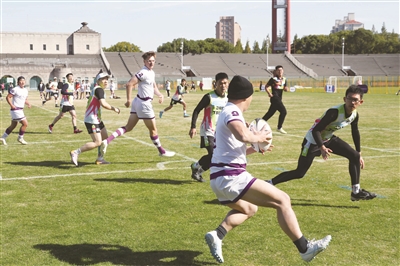By Mao Xinhui
Andrew Thomas, from South Africa, has been in Shanghai for six years. As a rugby enthusiast, Andrew has witnessed the gradual rise of the sport in the city.
Recently, the Shanghai City Amateur League's Rugby League, Yangtze River Delta Rugby Super League, and the Second "Four Seasons Global Cup" Touch Rugby Invitational began at the Jiangwan Stadium. This event is the largest scale touch rugby competition of the year for the Shanghai City Amateur League. At Jiangwan Stadium, Andrew found a group of like-minded enthusiasts.
"On the field, the sport is quite 'rough,' requiring full effort, but off the field, it's very 'gentlemanly,' allowing me to make many friends," Andrew said.
What is touch rugby? It's a sport evolved from traditional rugby. In the game, once a defender touches the player with the ball, the ball must be placed down for a teammate to continue the attack. The game emphasizes speed, passing, and team coordination over physical contact, making it suitable for all ages and genders.
This competition saw 26 teams from places like Shanghai, Beijing, Hong Kong, Hangzhou, and Ningbo. The participants ranged from university and high school team members to foreigners living and working in Beijing and Shanghai, as well as young players who have excelled in national competitions. "We came not just for the championship but to gain experience and learn from each other," said Zhu Wenyu from the Hong Kong Queen Elizabeth School Alumni Association Primary School.
It's reported that nearly a hundred schools in the city have introduced rugby, with the sport's events evolving from series to leagues. In December this year, the National Flag Rugby Championship will also be held in Shanghai. Plans are underway to further popularize the sport in schools, introduce various levels of competitions, and create more development pathways for athletes.
"I see more and more young people getting involved in grassroots levels, which is a very good sign. If children and their parents can both fall in love with this sport, then it can really take off," Andrew told the reporter.
Gathering for a game on the weekend, sweating it out on the field or grass, and experiencing the joy of dopamine release, sports are no longer confined to fitness or competition. "Playing sports for the sake of it and enjoying the fun" has become a lifestyle for many young people, and it could even be said that a new urban culture is emerging. Promoting this culture requires breaking down the "boundaries" between urban spaces and sports venues. When these boundaries blur, "playing sports for the sake of it" becomes even more accessible and enjoyable.
"I'm so refreshed after sweating it out!" Mr. Ren, a former tennis enthusiast, only got into pickleball this summer and instantly fell in love with it. Recently, the Shanghai City Amateur Tennis League's "PBC Club" Pickleball Carnival entered its second half at KIC. Equipped with professional gear, Mr. Ren fought valiantly in the games and achieved commendable results.
"Tennis has a high barrier to entry, but pickleball is a game that you can enjoy with family and friends who don't usually exercise. It's very sociable and fun," Mr. Ren said.
Sometimes leaping to hit a backhand, sometimes in a horse stance to furiously save the ball, the players in that day's match were all agile and quick. They were drenched in sweat after just a few rounds, yet they kept exclaiming how exhilarating it was.
The reporter noticed that the majority of the participants were white-collar workers. Many, like Mr. Ren, were new to pickleball. "I play almost every week, and I feel uneasy if I don't play a few games," Mr. Fan, a player, told the reporter. "As this sport becomes more popular, I believe more people will participate, and the level of competition will increase. I encourage more office workers to try it out and join in."
Pickleball originated in Seattle, USA. It's a sport involving hitting a ball with a racket, a hybrid of tennis, badminton, and table tennis. Recently, along with rugby, frisbee, and urban surfing, it's becoming a new favorite among young people. These trendy sports are emerging rapidly, injecting innovative energy into urban spaces.
Almost every weekend, the Jiangwan Stadium hosts various trendy sports events. Like the increasingly popular rugby, the stadium, in its old age, is rejuvenating. The Jiangwan Sports Center at KIC is empowering sports with culture and supporting sports with science and innovation. They're launching YEAHH PARK, a community-oriented urban culture content IP. It will continuously host sports events and cross-border carnivals, connecting urban sports communities, trendy brands, and participants, offering a more diverse sports experience to the public.
Lure fishing, a type of angling, has gained popularity among fishing enthusiasts in recent years. The Shanghai Fishing Association's Volcano Yangpu Base was established at Jiangwan Stadium, creating a top-quality, eco-friendly, convenient, and well-equipped "fishing paradise" for citizens.
"In the future, we hope the Volcano Yangpu Base will become a center for angling and outdoor sports, training national-level anglers and letting more people appreciate the charm of nature and the joy of outdoor activities," said Lu Wenhu, the head of the Yangpu Base.
"We've been thinking about how to keep the Jiangwan Stadium, this old building, vibrant," said Lu Hui, the operational manager of the Jiangwan Sports Center. This year, they've done a major renovation of the lawn and plan to turn it into a hub for trendy sports like rugby, baseball, pickleball, frisbee, equestrianism, and lure fishing. By connecting with nearby corporate sports communities and university clubs, they aim to attract more young people to join the national fitness movement.


